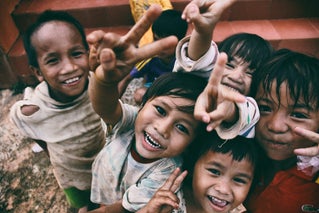
Changing the World Begins With Changing the Way We See Each Other
Refugees are NOT a burden.
“Animals.”
“Invaders.”
“An infestation.”
Refugees have had every cruel, dehumanizing label thrown at them. They’ve been scapegoated, demonized, and politicized. This is what inevitably happens when you reduce a person to an abstraction. It’s true for every form of violence and oppression—whether we’re talking about the refugee crisis in the Middle East or systemic racism in the United States.
This is the way things are. But it’s not the way things have to be.
We’ve lived and served alongside refugees for years. They’re not abstractions to us. They’re our friends. Many members of our team—our colleagues and co-conspirators—have been displaced themselves.
Refugees are NOT a burden
We believe that when you start with this posture—when you see the promise and possibility in every person—it changes everything.
It changes the way we provide emergency relief—food and medicine.
It’s why we go toward the vulnerable and displaced, meeting them where they are, rather than waiting for them to come to us. It’s why we step across the threshold and sit down with refugees in their homes, building a relationship that extends beyond “aid worker” and “recipient.” It’s why we were able to respond within hours, rather than days or weeks, when COVID-19 quarantined our Syrian refugee friends, leaving them with no way to work or buy food.
It changes the way we give long-term help—jobs that can withstand any disruption, even a global pandemic.
When we look at young refugees in Iraq or Syria or Mexico, we don’t see a threat. We see brilliant entrepreneurs and coders and designers. We see capable people, ready to provide for their families and rebuild their communities. We’ve been able to start hundreds of refugee-owned businesses—with over a 90% success rate—and launch a game-changing digital jobs platform that allows refugees to work from anywhere.
But it’s not just the way we work that’s different. It’s why we work.
We don’t ultimately measure success by how many food packs we distribute or how many jobs we create. We are working for something bigger. We are working to end war. To heal all that’s tearing us apart. To stop the next war before it starts.
This work begins by changing the way we see each other. Not as abstractions, but as people.
This work has never been more important. Not just in far-off war zones or refugee camps, but in our own communities. The playbook for violence and oppression is the same here as it is there. Reduce people to an abstraction. Dehumanize. Create distance.
It’s easier to ignore the plight of refugees if you see them as an infestation. It’s easier to ignore the scourge of racism if you can’t even bring yourself to say Black lives matter.
But when we choose to see people rather than abstractions, when we see the promise and possibility in every person, when we press in to listen and serve—a different world becomes possible. One where we all rise together.
May we rise to the occasion.
Preemptive Love exists to end war. Civil wars. Religious wars. Climate wars. Wars on black and brown bodies and on all who are told they don’t belong. The wars we fight around the world, in our neighborhoods, and in our hearts.
We believe in a world where everyone rises, where we belong to each other. We provide relief, jobs, and community to bring that world to life. To heal all that’s tearing us apart. To end war.




